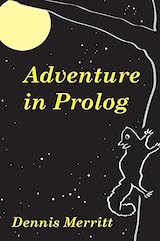
|
FreeComputerBooks.com
Links to Free Computer, Mathematics, Technical Books all over the World
|
|
- Title: Adventure in Prolog
- Author(s) Dennis Merritt
- Publisher: Independently published (November 10, 2017); eBook (Open Source)
- License(s): CC BY 3.0
- Hardcover/Paperback: 189 pages
- eBook: HTML and PDF
- Language: English
- ISBN-10: 1520918917
- ISBN-13: 978-1520918914
- Share This:

|
A tutorial that uses the very first interactive computer games to teach the expressive power of Prolog.
This book takes a pragmatic, rather than theoretical, approach to the language and is designed for programmers interested in adding this powerful language to their bag of tools. Much of the book will be built around the writing of a short adventure game. The adventure game is a good example since it contains mundane programming constructs, symbolic reasoning, natural language, data, and logic.
About the AuthorsN/A
- Prolog Programming
- Artificial Intelligence, Machine Learning, and Logic Programming
- LISP Programming Language
- Computer and Programming Languages
 Similar Books:
Similar Books:
-
 Prolog for Programmers (Feliks Kluznia, et al)
Prolog for Programmers (Feliks Kluznia, et al)
This book is intended as an introduction to Prolog for people familiar with conventional programming languages. It explains in terms of programming constructs and techniques found in Pascal.
-
 The Power of Prolog (Markus Triska)
The Power of Prolog (Markus Triska)
The goal of this book is to bridge the gap between the great traditional Prolog textbooks of the past and the language as it currently is. It is meant to teach Prolog as a practical programming tool and so it concentrates on using Prolog to solve interesting problems.
-
 Learn Prolog Now! (Patrick Blackburn, et al.)
Learn Prolog Now! (Patrick Blackburn, et al.)
This book has became one of the most popular introductions to the Prolog programming language, an introduction prized for its clarity and down-to-earth approach. The emphasis in this book is on using Prolog effectively.
-
 The Art of Prolog: Advanced Programming Techniques
The Art of Prolog: Advanced Programming Techniques
This book offers a departure from current books that focus on small programming examples requiring additional instruction in order to extend them to full programming projects. It shows how to design and organize moderate to large Prolog programs.
-
 Prolog Programming in Depth (Michael A. Covington)
Prolog Programming in Depth (Michael A. Covington)
This book covers the Prolog programming language thoroughly with an emphasis on building practical application software, not just theory. Readers build several types of expert systems, as well as natural language processing software and utilities.
-
 Logic, Programming and Prolog, 2nd Edition (Ulf Nilsson, et al)
Logic, Programming and Prolog, 2nd Edition (Ulf Nilsson, et al)
This book introduces major new developments in a continually evolving field and includes such topics as concurrency and equational and constraint logic programming. What sets this book apart from others on logic programming is the breadth of its coverage.
-
 An Introduction to Logic Programming Through Prolog (J. Spivey)
An Introduction to Logic Programming Through Prolog (J. Spivey)
This is one of the few texts that combines three essential theses in the study of logic programming: logic, programming, and implementation. The book contains a concise and self-contained account of the logic behind Prolog programming.
-
 Prolog Programming: A First Course (Paul Brna)
Prolog Programming: A First Course (Paul Brna)
The course for which these notes are designed is intended for undergraduate students who have some programming experience and may even have written a few programs in Prolog. The emphasis in this book is on using Prolog effectively.
-
 Prolog Experiments in Discrete Math, Logic, and Computability
Prolog Experiments in Discrete Math, Logic, and Computability
This book contains programming experiments that are designed to reinforce the learning of discrete mathematics, logic, and computability. The Prolog programming language is the tool used for the experiments in this book.
-
 Expert Systems in Prolog (Dennis Merritt)
Expert Systems in Prolog (Dennis Merritt)
For Prolog programmer interested in either building expert systems or experimenting with various expert system techniques. using a step-by-step approach to building systems, explaining the concepts and showing the Prolog code at each stage.
-
 AI Algorithms, Data Structures, and Idioms in Prolog, Lisp, and Java
AI Algorithms, Data Structures, and Idioms in Prolog, Lisp, and Java
Illustrateing how to program AI algorithms in Lisp, Prolog, and Java. Topics include: simple production-like system based on logic, logic-based learning, and natural language parsing.
-
 Simply Logical: Intelligent Reasoning by Example (Peter Flach)
Simply Logical: Intelligent Reasoning by Example (Peter Flach)
This book is an introduction to Prolog programming for artificial intelligence covering both basic and advanced AI material. A unique advantage to this work is the combination of AI, Prolog and Logic.
-
 Natural Language Processing for Prolog Programmers
Natural Language Processing for Prolog Programmers
An examination of natural language processing in Prolog for those who know Prolog but not linguistics, this book enables students to move quickly into writing and working in useful software.





